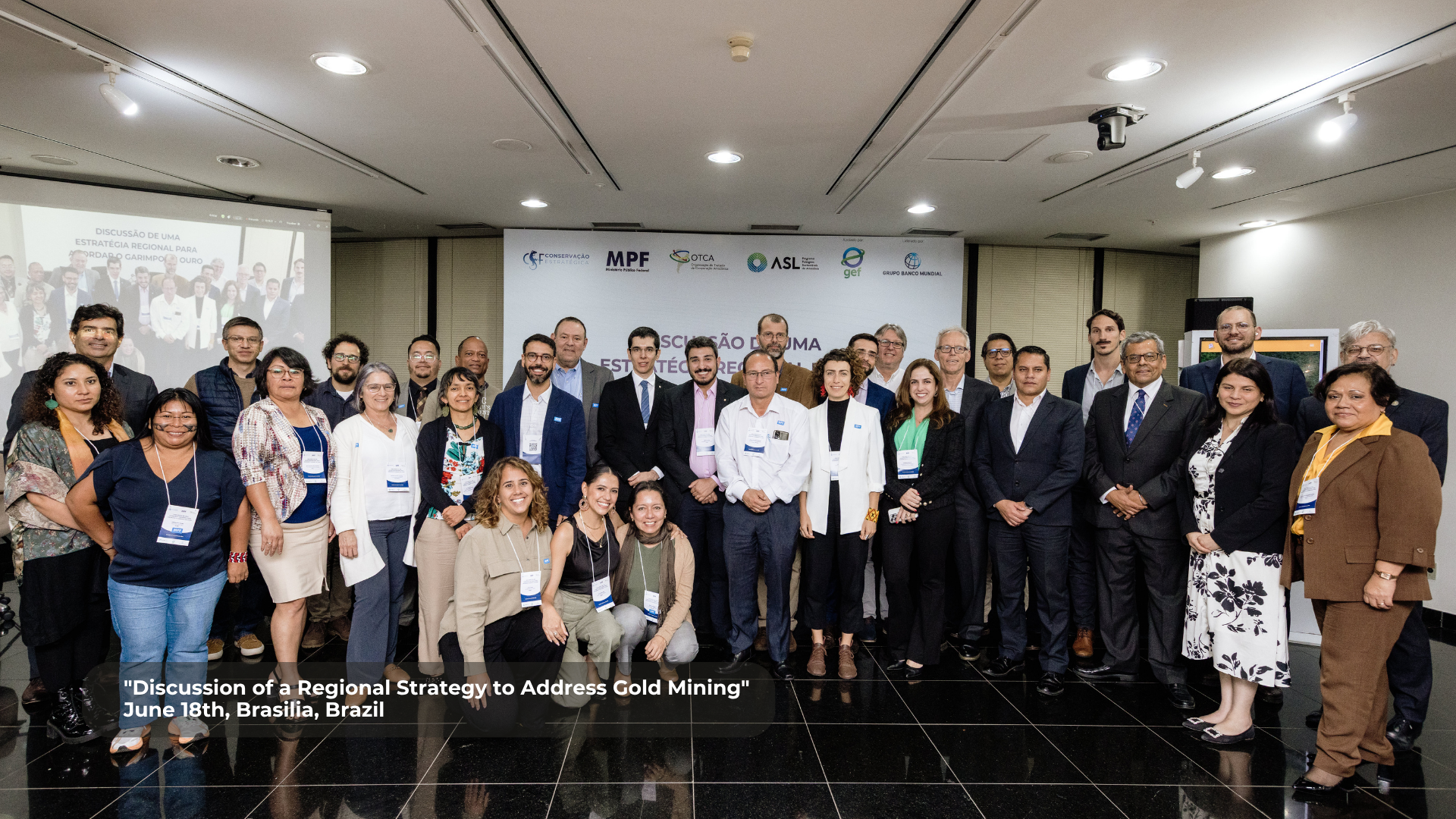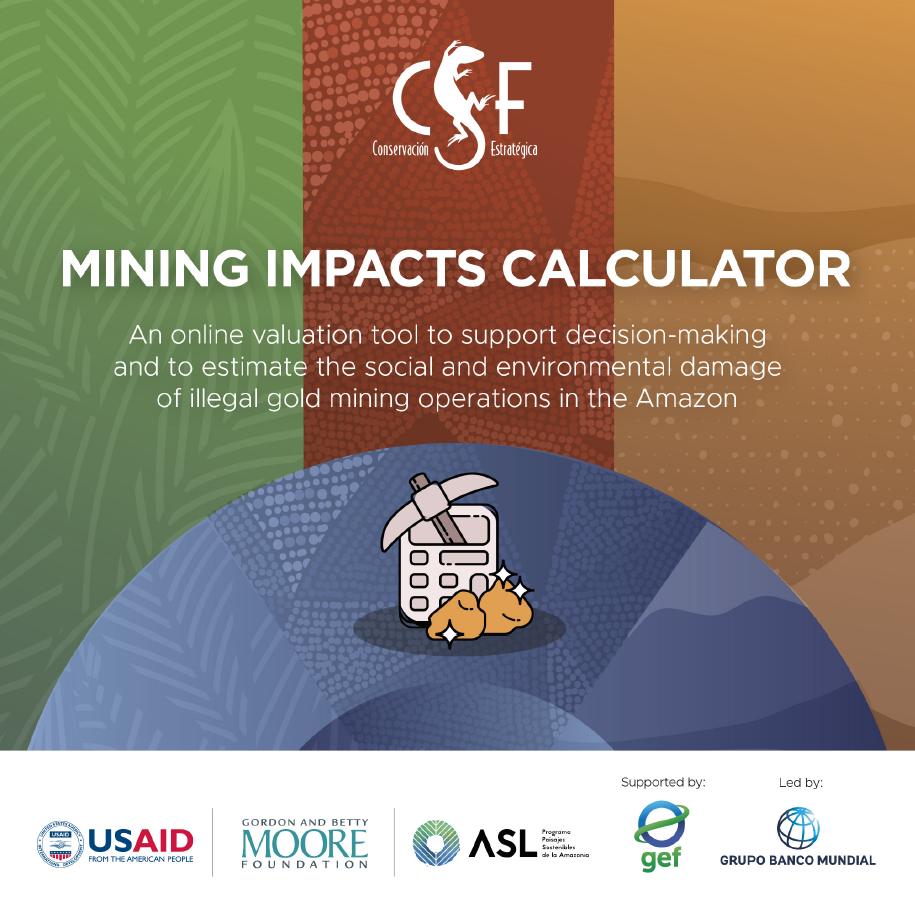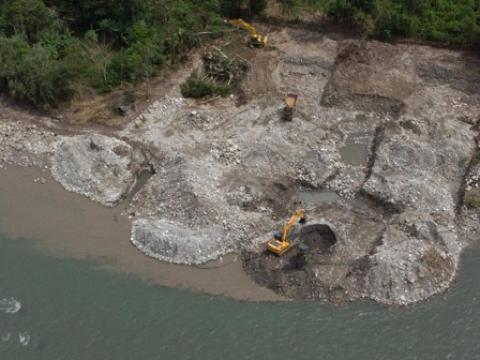Building a Regional Strategy to Address Gold Mining in the Amazon
Leaders from seven Amazonian countries gathered in Brasília for a regional workshop hosted by Conservation Strategy Fund to address the environmental, social, and legal impacts of mercury-based gold mining. The event highlighted the urgent need for cross-border cooperation and tools like the Mining Impacts Calculator to guide enforcement, protect ecosystems, and strengthen environmental governance across the Amazon.

Regional Voices, Collective Action
As the Amazon faces growing social, environmental, and economic threats from gold mining and mercury contamination, leaders from across the region came together for a pivotal workshop on June 18 in Brasília, Brazil. The event, “Discussion of a Regional Strategy to Address Gold Mining” offered a vital space for regional dialogue and collaboration.
Hosted by Conservation Strategy Fund (CSF), in partnership with Brazil’s Federal Public Ministry (MPF) and the Amazon Cooperation Treaty Organization (ACTO), the workshop was supported by the Amazon Sustainable Landscapes Program (ASL), led by the World Bank and funded by the Global Environment Facility (GEF).
Officials from Peru, Bolivia, Colombia, Ecuador, Brazil, Suriname, and Venezuela joined the conversation. Speakers included Ana María González (World Bank), Scott Edwards (CSF), Luiza Cristina Fonseca Frischeisen (MPF), and Mauro Luis Rufino (ACTO), who opened the event by emphasizing the urgency of a coordinated regional approach.
Ana María González of the World Bank highlighted CSF’s Mining Impacts Calculator, as an innovative tool whose adoption requires political will to become a key input for decision-making.
On behalf of CSF, Scott Edwards emphasizes that good decisions require good information. CSF responds to this call by combining science, economics, and local knowledge to build evidence-based conservation strategies that protect ecosystems and people - the Mining Impacts Calculator (MIC), for example, is a data-driven tool to support nature conservation and reduce the destruction of mining operations across vital landscapes.
Luiza Cristina Fonseca Frischeisen of the Public Ministry agreed that coordinated action between affected countries is vital to address the impacts of illegal mining in the Amazon, especially the far-reaching impacts of mercury pollution. She mentioned the MIC’s contribution to strengthening legal actions, accurately estimating environmental and climate damage, and advancing toward effective remediation processes.
Mauro Luis Rufino of ACTO agreed that illegal gold mining and its transboundary impacts require a joint response. He also reaffirmed ACTO's commitment to facilitating dialogue and cooperation among Amazonian countries, with the aim of strengthening regional capacities and moving toward integrated, technically sound, and forward-looking solutions.
Technical Innovation Meets Policy Change
The workshop combined technical sessions with high-level discussions. Participants explored the real-world applications for the MIC in Brazil with a presentation by Pedro Gasparinetti, Director of Innovation at CSF, who explained the technical and methodological foundations of the calculator, highlighting its applicability to different contexts in the Amazon region.
Raquel Caroline (IBAMA), Erich Adam Moreira (Federal Police), and Gustavo Kenner (Federal Public Ministry) shared their experiences using the tool in Brazil to inform investigations, guide enforcement, and strengthen judicial processes related to illegal mining.
These case studies demonstrated how science, economics, and legal frameworks can work together to confront illegal mining in a sustainable way.
Indigenous Leadership and Mercury Pollution
Indigenous perspectives were central to the discussion. Alessandra Korap, leader of the Munduruku people, delivered a powerful message on the devastating health impacts of gold mining in Indigenous territories:
“We do not accept mining in our territory, much less its legalization, inside or outside indigenous territories, because the impact on our health is very great.”
Mauro Rufino and Fernando Cisneros from ACTO then presented their work on the issue of mercury contamination, in response to the Belem Mandate. Fernando Cisneros gave an overview of the study “Regional Overview of Mercury,” which establishes a baseline for identifying sources of contamination, risk areas, and priorities for intervention in the Amazon basin.
Watch the morning presentations here
Charting a Shared Path Forward
A high-level dialogue moderated by Rocío Rodríguez (CSF) brought together decision-makers from Bolivia, Colombia, Ecuador, Peru, Suriname, and Brazil to discuss the next steps towards a regional strategy to address the impacts of gold mining.
Allen Ballesteros (Ministry of Mining and Metallurgy – Bolivia), Manuela Ruiz Reyes (Ministry of Environment – Colombia), Erik Salas Haro (Mining Regulation and Control Agency – Ecuador), Jeny León Alvarado (Attorney General's Office – Peru), John Johanns (Small-Scale Gold Mining Regulation Unit – Suriname) and Gustavo Kenner (Federal Public Ministry – Brazil) shared their challenges leading national efforts to regulate this industry and enforce environmental protections.
Common themes emerged during the panel, such as the transboundary nature of mercury pollution and deforestation, and the urgent need for coordinated policies, strong legal frameworks and shared tools. There was a clear emphasis on the immediate danger of mercury pollution and its impact on Indigenous Peoples and ecosystems.
Colombian representatives warned that illegal mining compromises not only biodiversity but also territorial security, highlighting the urgent need for effective collaborative action. Peru's Attorney General's Office emphasized that tools like the Mining Impacts Calculator strengthen the technical basis for legal action, translating environmental damage into concrete legal evidence. Suriname’s representatives underscored the value of cross-country knowledge exchange to build national capacity.
The countries shared stories of progress and challenges in regulating the industry to reduce environmental harm. Representatives from Bolivia, Colombia, Ecuador, Peru, Suriname, and Venezuela presented their national experiences, highlighting evolving legal frameworks, inter-institutional coordination mechanisms, and efforts to improve environmental monitoring. The exchange allowed for the identification of commonalities and opportunities for regional collaboration to strengthen environmental governance in the Amazon. This round of technical presentations was also attended by Daniel Gómez Cure (Attorney General's Office of Colombia), Verónica Ayala Richter (Ministry of the Interior of Peru), and Cristina Vollmer de Burelli (SOS Orinoco of Venezuela). This exchange of experiences revealed shared challenges—and opened doors to regional solutions.
Watch the afternoon presentations here.
Building a Coordinated Regional Response
The workshop laid the groundwork for ongoing dialogue among Amazonian countries to jointly tackle the challenges of mercury-based gold mining. Through open exchanges, participants identified shared priorities, specific national needs, and potential areas for cross-border collaboration to protect ecosystems, Indigenous peoples, and local communities most affected by illegal mining.
The event reinforced a key message: regional cooperation grounded in data, evidence, and local experience is essential to addressing an issue that transcends national borders. As Alfonso Malky, CSF’s Latin America Director, noted, the process highlights the power of linking science with public decision-making through innovative tools tailored to each country’s context.
“The Calculator reflects how the generation of reliable data can be translated into action. But it is also the result of solid partnerships between institutions and countries, which must continue to be strengthened to address challenges as complex as illegal mining,” he said.
Relive the highlights of the regional workshop “Discussion of a Regional Strategy to Address Gold Mining"
About the Mining Impacts Calculator
The Mining Impacts Calculator (MIC) estimates the social and environmental damage associated with gold mining in the Amazon in terms of deforestation, river sedimentation, and mercury pollution. The tool then translates this value into qualitative, monetary terms for use in policy coherence and regulation. The MIC is currently being used officially in Brazil and has been adapted in other countries in the region, serving as an input for the formulation of public policies and strategies for both prevention and mitigation.
Visit CSF's suite of free tools for environmental decisions making.
Available in Spanish.
- Log in to post comments



